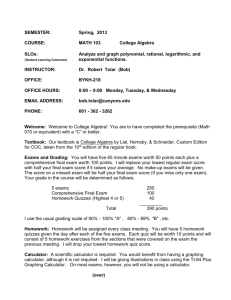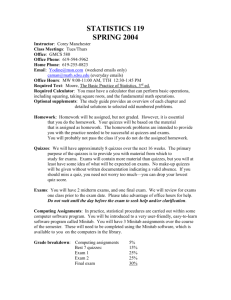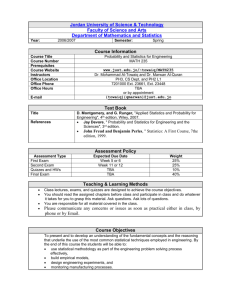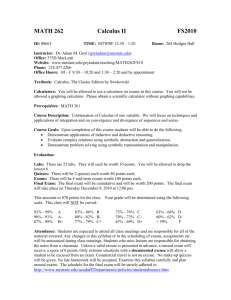MATH 147 Elementary Statistics Spring 2016
advertisement
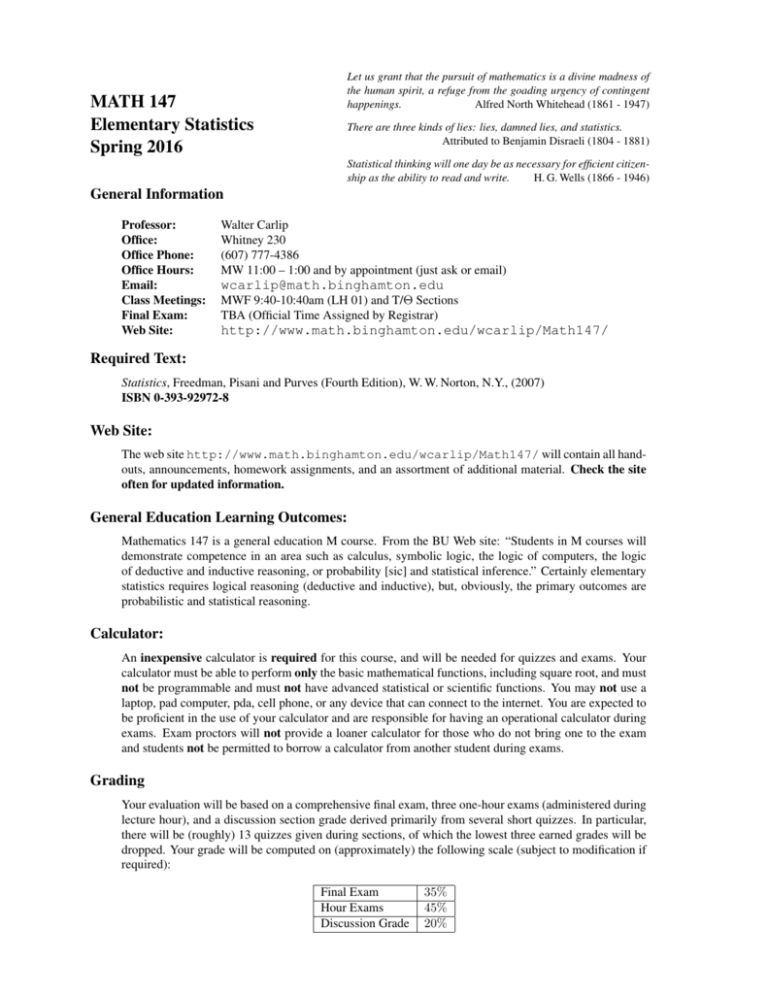
MATH 147 Elementary Statistics Spring 2016 Let us grant that the pursuit of mathematics is a divine madness of the human spirit, a refuge from the goading urgency of contingent happenings. Alfred North Whitehead (1861 - 1947) There are three kinds of lies: lies, damned lies, and statistics. Attributed to Benjamin Disraeli (1804 - 1881) Statistical thinking will one day be as necessary for efficient citizenship as the ability to read and write. H. G. Wells (1866 - 1946) General Information Professor: Office: Office Phone: Office Hours: Email: Class Meetings: Final Exam: Web Site: Walter Carlip Whitney 230 (607) 777-4386 MW 11:00 – 1:00 and by appointment (just ask or email) wcarlip@math.binghamton.edu MWF 9:40-10:40am (LH 01) and T/Θ Sections TBA (Official Time Assigned by Registrar) http://www.math.binghamton.edu/wcarlip/Math147/ Required Text: Statistics, Freedman, Pisani and Purves (Fourth Edition), W. W. Norton, N.Y., (2007) ISBN 0-393-92972-8 Web Site: The web site http://www.math.binghamton.edu/wcarlip/Math147/ will contain all handouts, announcements, homework assignments, and an assortment of additional material. Check the site often for updated information. General Education Learning Outcomes: Mathematics 147 is a general education M course. From the BU Web site: “Students in M courses will demonstrate competence in an area such as calculus, symbolic logic, the logic of computers, the logic of deductive and inductive reasoning, or probability [sic] and statistical inference.” Certainly elementary statistics requires logical reasoning (deductive and inductive), but, obviously, the primary outcomes are probabilistic and statistical reasoning. Calculator: An inexpensive calculator is required for this course, and will be needed for quizzes and exams. Your calculator must be able to perform only the basic mathematical functions, including square root, and must not be programmable and must not have advanced statistical or scientific functions. You may not use a laptop, pad computer, pda, cell phone, or any device that can connect to the internet. You are expected to be proficient in the use of your calculator and are responsible for having an operational calculator during exams. Exam proctors will not provide a loaner calculator for those who do not bring one to the exam and students not be permitted to borrow a calculator from another student during exams. Grading Your evaluation will be based on a comprehensive final exam, three one-hour exams (administered during lecture hour), and a discussion section grade derived primarily from several short quizzes. In particular, there will be (roughly) 13 quizzes given during sections, of which the lowest three earned grades will be dropped. Your grade will be computed on (approximately) the following scale (subject to modification if required): Final Exam Hour Exams Discussion Grade 35% 45% 20% Course Description Math 147 is an elementary introduction to probability and statistics. We will be covering almost all of the textbook, including design of experiments, descriptive statistics (mean, standard deviation), classification of data, frequency distributions, correlation and regression, elementary probability, the normal curve, elementary sampling theory, confidence intervals, and tests of statistical hypotheses. For a detailed schedule, see the class web site. Course Policies • Makeup exams will only be given under extraordinary circumstances. If you cannot attend one of the exams you must submit a written reason for your absence in advance of the exam date. Usually at least one week notice is required. In case of an emergency, you can call my office and follow-up with an email message. The decision to allow make-up exams will be made by the instructor on a case by case basis, and will usually require a verified university sanctioned reason. No make-up exams will be given without advance notice. • The final exam will be given during finals week in the officially scheduled time slot and can only be taken at another time for a verified, university sanctioned reason. Be sure to check the final exam date before you make airplane reservations for the end of the semester! • The dates for the three one-hour exams appear on the class schedule, accessible via the class web site. You can assume that these dates are firm. Be sure to check the exam schedule before making any travel plans or commitments. Note that, unfortunately, the third exam lands during the week of Passover, which lands at an awkward time this semester. If you have a serious religious proscription against taking the exam on this day, you must provide written notice with verification at least a week in advance, and discuss accommodation with me in person. • The current schedule calls for 13 quizzes to be given during section meetings. That means you should expect a quiz every section meeting after the first, including the Tuesdays following the Monday midterm exams. Attendance at all section meetings for the full 85 minutes is required! Three (taken) quizzes will be dropped. There will be no makeup quizzes, but quizzes missed for a valid reason will be included among the three that are dropped. • Cell phones and internet connected devices of any sort are prohibited during exams. • Appeals of grading must be submitted in writing within one week of receipt of the evaluation. You should appeal first to your section leader, who will bring the problem (if necessary) to the head TA. If the problem is not resolved at that point, you can bring the appeal to me. • You should regularly check the class web site for announcements. Attendance I view class attendance to be a very important part of every course. While I will generally follow the text, I will from time-to-time introduce material in class that does not appear in the text. You will be responsible for all material covered in class, including some that may not appear in the text. Consequently, attendance of all lectures is strongly recommended. Attendance at all section meetings is required. In section, you should be prepared to ask questions, discuss homework problems, and work effectively with your classmates. Remember that quizzes will be administered essentially every section meeting. Help Room, TAs, and Office Hours If you are lost, confused or having any kind of difficulty with the course, I encourage you to seek help. You should take advantage of the mathematics help room. Each TA for Math 147 has assigned hours in the help room, so there will almost always be a TA available for help. When there is no Math 147 TA available in the help room, you can ask any of the help room staff for help. You do not have to restrict your use of the help room to your own TA. You are welcome to come to the help rooms or undergraduate lounge (both on the second floor of Whitney) to work on your homework. I will post the help room hours and schedule on our web site when they become available. You are also always welcome to come to my office hours to discuss the class material. I will be available at other times (by appointment) and would enjoy meeting with you individually (or in groups). Do not hesitate to talk to me after class or email me to arrange an appointment or ask a question. Academic Honesty Honesty and integrity are essential to the spirit and purpose of educational institutions, and I might add, to your own self-esteem. It is an important part of learning to read and use the work of other scholars, but you should take pride in giving credit when you borrow someone else’s work – be it a well-know author or researcher, or a fellow student. Cheating and classroom disruption of any kind will not be tolerated in this class. This includes (but is not limited to) plagiarism of any sort, including cheating on examinations, quizzes, or other written assignments. In particular, if you work together with another student on an assignment, you should always write-up your solutions on your own, and give credit to your colleague for discussion and inspiration. Midterm exams for this course are held in Lecture Hall 1, where the seating is tight. Seating will be assigned and timing will be strict. • Working past the ending time of the exam will result in a penalty. • Copying from another student or having any contact with another student’s exam – from this year or other years – will also result in a very strict penalty. • Posting or copying of copyrighted material – including exams and lecture notes – is also prohibited. Some of the things that constitute plagiarism or academic dishonesty include: • Turning in work written by another student; • Using another student’s solution of a problem without giving them credit; • Obtaining a solution from the internet, a faculty member, tutor, or a student who has previously taken the course; • Copying work from a book without providing a precise citation. • Copying from another student’s exam paper. Note that the exams and lecture notes for this course are copyrighted material. Sharing them with others – in person or online – is explicitly prohibited, and using such materials obtained from current or former classes or students is not permitted. The penalties for academic dishonesty in this class and university can be very severe. If you have any questions on issues related to academic honesty, please ask. For additional information on academic honesty here at Binghamton, read the Student Academic Honesty Code: http://buweb.binghamton.edu/bulletin/program.asp?program_id=1004

